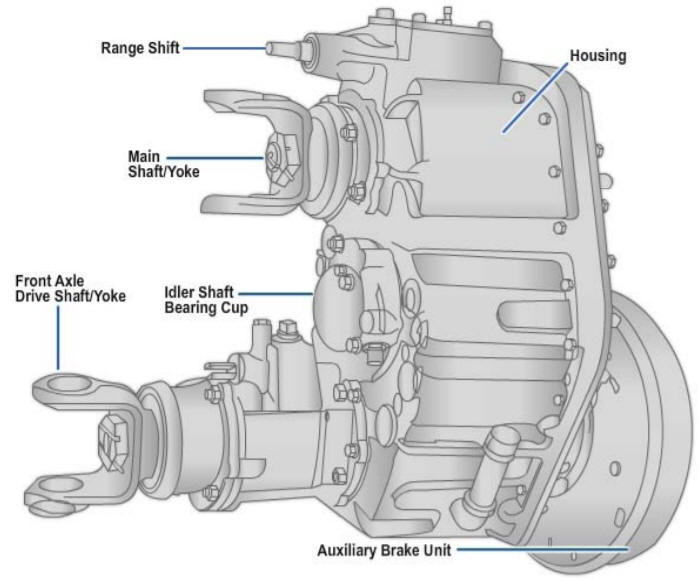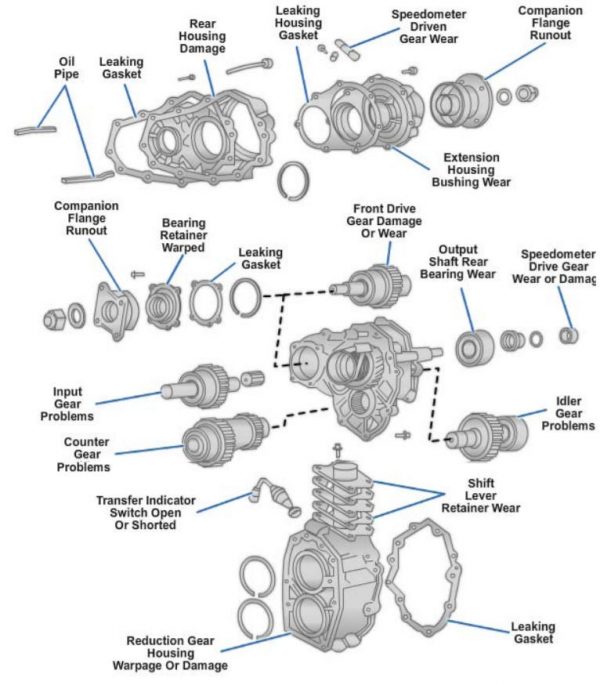Rebuilt Transfer Case
All Rebuilt Transfer Case models in stock ready to ship Worldwide today with same day shipping options available. We have successfully exported to over 60 countries worldwide and we know what it takes to get the job done right the first time. Our goal is to assist you in completing your job as quickly as possible. Transfer cases rebuilt by Pro Gear are covered with a one-year unlimited mileage warranty. If you have any questions we are happy to help contact us to speak with an expert.
Signs of a Failing Transfer Case
The way your transfer case works is that it takes power from the transmission and directs it to both ends of your car, or axles, through two separate drive shafts. You can locate it on the rear of the transmission where it gets its power from the engine. Once the power comes through the engine to the transmission, it goes through the transfer case to the front and rear wheels. If your transfer case fails you can repair it, or replace it with a new or rebuilt transfer case. When your transfer case begins to fail you may notice the following issues:
Strange Noises
Hearing a noise that sounds like a gear popping out could indicate the need more lubrication or that a component is worn. It could also mean that your gears are  worn or damaged, or that your chain is damaged, in a chain driven transfer case.
worn or damaged, or that your chain is damaged, in a chain driven transfer case.
Gears Popping Out
If your gears keep popping out, it can mean that your gears are worn and can’t keep your truck in two or four wheel drive. This is usually an issue that comes on gradually but can indicate a serious problem.
Leaking Seals
After time your seals can break down and start to leak. If you don’t address a leaking seal it can lead to inadequate lubrication and serious internal damage.
Hard Shifting
Hard shifting may be caused by a shift linkage that is bent or worn. In some cases, the linkage simply needs lubrication. If the linkage is okay, the problem may be caused by bent or damaged shift forks inside the transfer case.
Transfer Case Shudder
A hard jerking motion that occurs while accelerating could be caused by fluid levels, loose transfer case fasteners, worn gears or bearings, or defective internal clutches. A shudder may also occur at low speeds on vehicles with a defective viscous coupling or clutch pack.
If you have any questions or need assistance, give us a call.
| Transfer Case Diagnosis (part time drive) | ||
|---|---|---|
| Problem | Possible Cause | Solution |
| Noisy Operation* | 1. Worn bearings, splines, chipped gears or worn shafts 2. Low lubrication levels 3. Loose or broken mounts |
1. Rebuild unit 2. Fill to correct level 3. Tighten or replace mounts |
| Jumps out of 2-wheel drive | 1. Shift lever detent spring weak or broken 2. Sliding clutch spline engaging surface worn or tapered |
1. Replace spring 2. Replace worn parts |
| Jumps out of gear in 4-wheel drive | 1. Shift lever interference with floor pan 2. Excessive transfer case movement 3. Sliding clitch engaging surface tapered or worn 4. Bent shift fork 5. Shift rod detent spring weak or broken 6. Shift lever torsion spring not holding 7. Worn bearings, gear teeth or shafts |
1. Provide proper clearance 2. Check/replace transfer case mounts 3.Replace worn parts 4. Replace shift fork 5. Replace detent spring 6. Replace torsion spring 7. Overhaul unit |
*note: transfer cases using a gear drive will produce a gear whine, this is normal
| Transfer Case Diagnosis (full time drive) | ||
|---|---|---|
| Problem | Possible Cause | Solution |
| Noisy Operation | 1. Low or improper lubrication level 2. Operating in “lockout” on hard dry surface roads. 3. Excessive wear on gears, chains or differentials 4. Loose or deteriorated mounts. |
1. Fill to correct level 2. Shift out of “lockout” 3. Rebuild as needed 4. Tighten or replace mounts. |
| Jumps or is hard to shift out of low range | 1. Shift link improperly adjusted, bent or broken 2. Shift rails dry or scored 3. Reduction unit parts worn or damaged |
1. Adjust, straighten or replace shift linkage 2. Clean, polish or lubricate as necessary 3. Repair or replace as needed |
| Lockout will not engage | 1. Lockout parts damaged 2. Defective vacuum control, loose or damaged vacuum lines 3. Defective shift linkage |
1. Repair as needed 2. Replace control/ Replace or connect vacuum hose 3. Repair or replace |
| Two-wheel drive will not engage | 1. No vacuum/ Loose or broken hoses 2. Defective shift motor (axle) 3. Defective shift motor (transfer case) |
1. Replace hose and secure all loose connections 2. Replace shift motor 3. Replace shift motor |
| Four-wheel drive will not engage | 1. No vacuum/ Loose or broken hoses 2. Defective shift motor (axle) 3. Binding or broken transfer case shift linkage 4. Defective axle shift linkage 5. Damaged transfer case |
1. Replace hose and secure all loose connections 2. Replace shift motor 3. Repair or replace shift linkage 4. Repair or replace shift linkage 5. Repair or replace transfer case |
| Vehicle drifts when driving straight | 1. Improperly matched tire size 2. Uneven tire pressure (axle) |
1. Use matched set of tires 2. Adjust air pressure level to recommended level |

